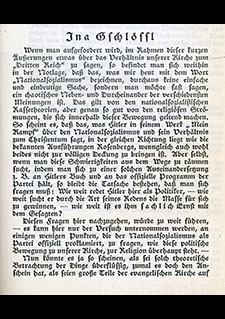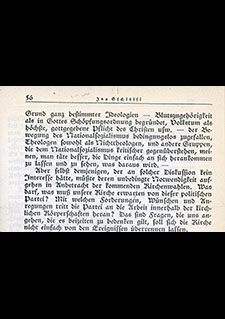Rejection of National Socialism
In the spring of 1932, Leopold Klotz, a publisher in Gotha, asked representatives of the Protestant church to give their views on the question of whether and to what extent they believed the major new liberation movement sweeping our nation will be able to hold up to the Protestant faith (Klotz, Kirche 1, 5f.). Statements from forty-three theologians were ultimately published in the two-volume work, “Die Kirche und das dritte Reich. Fragen und Forderungen deutscher Theologen” (The Church and the Third Reich. Questions and Challenges for German Theologians).
Twelve of those surveyed responded to the aforementioned question absolutely positively; another twelve voiced indecision, citing positive and negative points perceived in National Socialism. At any rate, nineteen responses flatly rejected National Socialism.
The latter group also included Ina Gschlössl, one of the few women asked for a statement.
While many theologians increasingly celebrated Hitler’s successes since the early 1930s as “liberation”, they astutely analyzed what the church could expect from this movement and what demands the party had on the church.
Source / title
- © Ev. Arbeitsgemeinschaft für Kirchl. Zeitgeschichte, München


